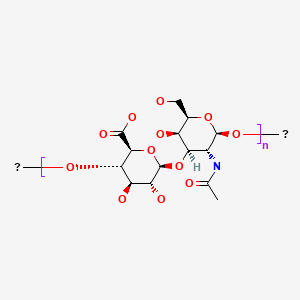CASRN: 9007-27-6

Drug Levels and Effects
Summary of Use during Lactation
Chondroitin sulfate consists of a mixture of large glycosaminoglycans and disaccharide polymers, usually derived from shark or bovine cartilage. It is most commonly used to treat osteoarthritis. Chondroitin sulfate has no specific lactation-related uses. Chondroitin sulfate is poorly absorbed orally with a bioavailability of about 10%. It is well tolerated with occasional gastrointestinal upset reported. Although no studies exist on the use of chondroitin sulfate supplements during breastfeeding, small amounts occur naturally in breastmilk where it might have an inhibitory effect on microbial binding to cellular receptors in the infant or, helping prevent infections, or acting as an antioxidant to protect the infant from oxidative stress. Mothers of preterm infants excrete greater amounts of chondroitin into breastmilk than mothers of fullterm infants.[1,2] The use of chondroitin by a nursing mother is unlikely to adversely affect the breastfed infant.
Dietary supplements do not require extensive pre-marketing approval from the U.S. Food and Drug Administration. Manufacturers are responsible to ensure the safety, but do not need to prove the safety and effectiveness of dietary supplements before they are marketed. Dietary supplements may contain multiple ingredients, and differences are often found between labeled and actual ingredients or their amounts. A manufacturer may contract with an independent organization to verify the quality of a product or its ingredients, but that does not certify the safety or effectiveness of a product. Because of the above issues, clinical testing results on one product may not be applicable to other products. More detailed information about dietary supplements is available elsewhere on the LactMed Web site.
Drug Levels
Maternal Levels. Pooled human milk from healthy subjects was found to have an average chondroitin sulfate concentration of 231 mg/L, representing 55.5% of all human milk glycosaminoglycans.[1]
A lactating woman with unilateral breast cancer had the breastmilk chondroitin sulfate content analyzed from each breast. Milk from the unaffected breast had chondroitin sulfate content similar to previous studies. Milk from the cancerous breast had a large increase in the chondroitin sulfate disaccharide sulfated in position 6 of N-acetylgalactosamine.[3]
Infant Levels. Relevant published information was not found as of the revision date.
Effects in Breastfed Infants
Relevant published information was not found as of the revision date.
Effects on Lactation and Breastmilk
Relevant published information was not found as of the revision date.
References
- 1.
- Coppa GV, Gabrielli O, Buzzega D, et al. Composition and structure elucidation of human milk glycosaminoglycans. Glycobiology. 2011;21:295–303. [PubMed: 21030540]
- 2.
- Coppa GV, Gabrielli O, Zampini L, et al. Glycosaminoglycan content in term and preterm milk during the first month of lactation. Neonatology. 2012;101:74–6. [PubMed: 21934331]
- 3.
- Mannello F, Maccari F, Santinelli A, et al. Chondroitin sulfate structure is modified in human milk produced by breast affected by invasive carcinoma. Breast. 2011;20:586–7. [PubMed: 21937233]
Substance Identification
Substance Name
Chondroitin
CAS Registry Number
9007-27-6
Drug Class
Breast Feeding
Lactation
Complementary Therapies
Glycosaminoglycans
Disclaimer: Information presented in this database is not meant as a substitute for professional judgment. You should consult your healthcare provider for breastfeeding advice related to your particular situation. The U.S. government does not warrant or assume any liability or responsibility for the accuracy or completeness of the information on this Site.
Publication Details
Publication History
Last Revision: May 17, 2021.
Copyright
Attribution Statement: LactMed is a registered trademark of the U.S. Department of Health and Human Services.
Publisher
National Institute of Child Health and Human Development, Bethesda (MD)
NLM Citation
Drugs and Lactation Database (LactMed®) [Internet]. Bethesda (MD): National Institute of Child Health and Human Development; 2006-. Chondroitin. [Updated 2021 May 17].